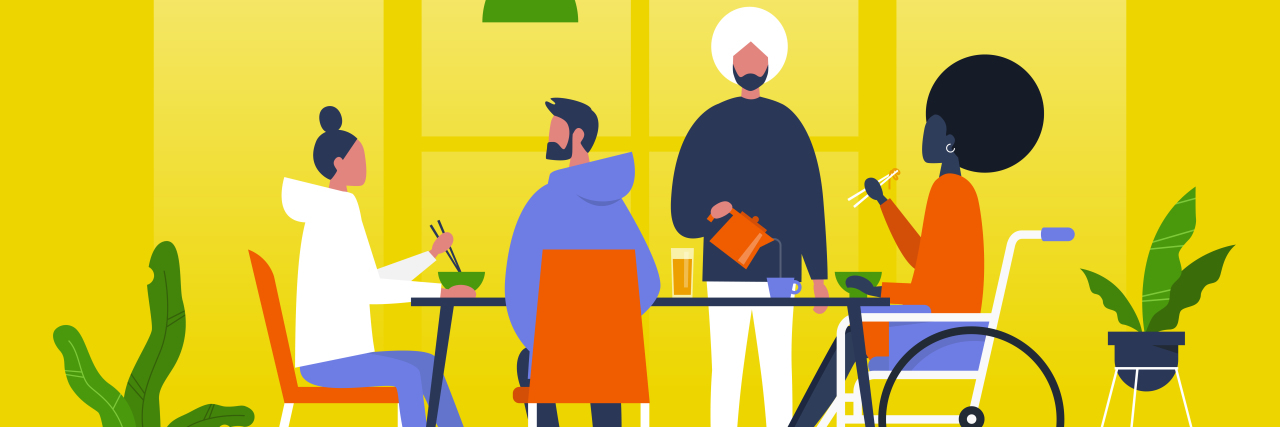“She bit my head off because I waved at her service dog!”
“I wish people would just leave my service dog alone!”
“I was only trying to help, and he yelled at me!”
“Don’t assume I’m helpless because I use a walker!”
“Why are disabled women so bitchy?”
“He just grabbed my wheelchair without even asking!”
While browsing through disability-related content on social media, I have been seeing a lot of angry, hurt and perplexed comments such as these recently. It got me thinking about why there is so much conflict and misunderstanding around disability rights, and how to better avoid it.
Whenever a social movement gains traction, there also arises tension and pushback, which often leads to misunderstandings and increased confusion. Change, learning and personal growth are not easy, particularly if your beliefs and convictions have been deeply ingrained throughout your life. It can be confusing to learn constantly evolving language and etiquette, and people often worry about unintentionally saying the wrong thing. Although there have been many lists published about the “Dos and Don’ts” of disability etiquette, every social situation is different, and every disabled individual feels differently. There is no sure-fire cheat sheet, except one: treat people with disabilities like an average human being. Just like you.
What does that mean? It means that like you, everyone feels, everyone struggles, everyone has accomplishments and failures, dreams and fears, everyone has personal experiences and something to learn, and everyone makes mistakes. However, when we encounter strangers, we have no idea what that person is thinking and feeling at that moment, nor do we often even care. After all, we are all living our own complex, emotionally charged lives, and that is what occupies our minds most of the time.
When something suddenly occurs that upsets us, our first thoughts are often naturally for ourselves and how we feel, not for the other person. This is where mindfulness is so important. If we can teach ourselves to pause before we react, to process the circumstances and briefly consider the other person’s position, we can avoid the anger and hurt that often result from sudden conflict.
Imagine you are me, a disabled wheelchair user, going to appointments and running errands. You are just going about your business like anyone else. Today, so far, some guy on the bus said, “You’re too pretty to be in a wheelchair,” another guy suddenly grabbed the back of your chair to “help” you cross the road, and a department store clerk patted your shoulder like a dog after she helped you find doggy treats. Sure, they were mild missteps by well-meaning people, but each time it affected you, and now you’re feeling anxious and annoyed.
You are now in the grocery store, straining to reach a can of tomatoes. You’re just about to retrieve your hard-earned prize when a woman suddenly leans over you without asking, plucks the can from the shelf, and hands it to you. That’s it! You snatch the can from her angrily, and snap at her about not needing help. Oops. You didn’t mean to bite her head off, but enough is enough!
Imagine you’re an average person at the grocery store. Your mom died a month ago after battling an illness, and this is the first day you’ve had the energy to go out and get much-needed groceries. You left the kids with your partner, who has been sick with the flu for two weeks and unable to work, so you’re hoping you have enough money to cover groceries. The store is out of your eldest’s favorite cereal, and you just know she’s going to freak out. As you wait for a cashier, you notice a woman in a wheelchair struggling to reach a can of tomatoes on a higher shelf. Wanting to help, you go over, pluck the can off the shelf, and hand it to her with a smile. She turns on you angrily, and snaps: “Did I even ask for your help?” and wheels away.
I believe we have become so hyper-vigilant about our rights as individuals, as groups, as communities that we forget about our privileges. We are so suspicious about how others view and treat us that we forget to take accountability for our own behavior. And we are so focused on how someone made us feel that we fail to recognize how we’ve made them feel. If we take a moment to evaluate the situation, weigh the seriousness of the “offense,” and be mindful that others have their own personal struggles, we have the power to prevent conflict and hurt feelings.
Now, I’m not suggesting we ignore hatefulness, discrimination and passive-aggressive behavior. Real change comes from directly addressing these issues instead of running from or ignoring them. Everyone has the right to stand up for themselves if they feel they’ve been violated, discriminated against, insulted or mistreated. But many misunderstandings occur because of lack of information or understanding, honest mistakes and knee-jerk reactions.
Take the time to educate yourself about people with disabilities. Recognize that everyone has their own experiences, struggles and emotions that affect the way they think and behave in different situations. Take a moment to evaluate the situation before reacting. And for goodness sake, cut each other some slack!
It has been my experience that most people do not mean to offend or hurt someone. Given a safe opportunity, they will apologize for their mistake or be willing to learn from it. People don’t usually snap at one another for no reason. There is usually much more to the story than what pops out of their mouth under stress.
This is all easier said than done, I know. We are, after all, only human, and social situations can be subtle or complex. But if we all at least make the effort, the world may become a kinder, more empathetic place.
Getty image by Nadia Bormotova.

